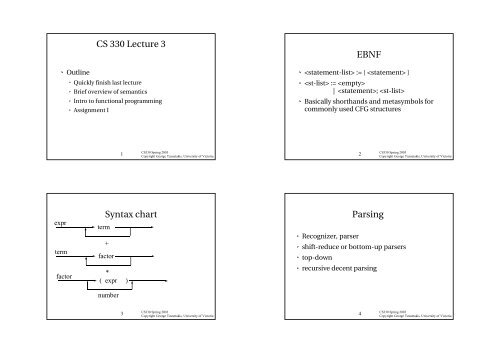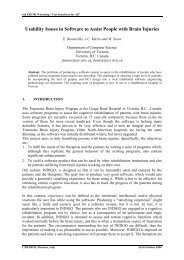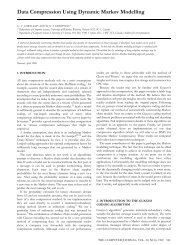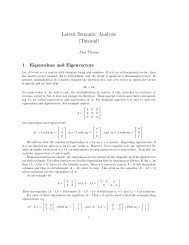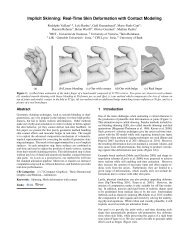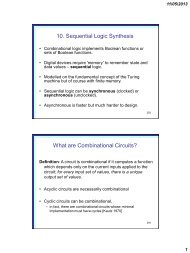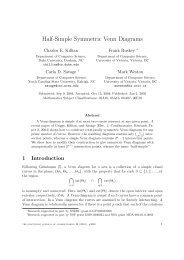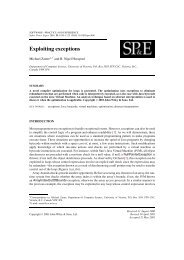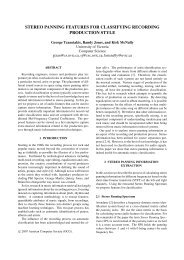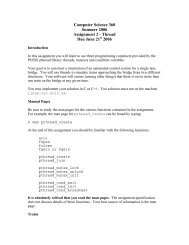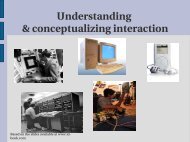CS 330 Lecture 3 EBNF Syntax chart Parsing - University of Victoria
CS 330 Lecture 3 EBNF Syntax chart Parsing - University of Victoria
CS 330 Lecture 3 EBNF Syntax chart Parsing - University of Victoria
Create successful ePaper yourself
Turn your PDF publications into a flip-book with our unique Google optimized e-Paper software.
¡<br />
¡<br />
¡<br />
¡<br />
Outline<br />
<strong>CS</strong> <strong>330</strong> <strong>Lecture</strong> 3<br />
Quickly finish last lecture<br />
Brief overview <strong>of</strong> semantics<br />
Intro to functional programming<br />
Assignment I<br />
<strong>EBNF</strong><br />
:= { }<br />
:= <br />
| ; <br />
Basically shorthands and metasymbols for<br />
commonly used CFG structures<br />
1<br />
<strong>CS</strong><strong>330</strong> Spring 2003<br />
Copyright George Tzanetakis, <strong>University</strong> <strong>of</strong> <strong>Victoria</strong><br />
2<br />
<strong>CS</strong><strong>330</strong> Spring 2003<br />
Copyright George Tzanetakis, <strong>University</strong> <strong>of</strong> <strong>Victoria</strong><br />
expr<br />
term<br />
factor<br />
<strong>Syntax</strong> <strong>chart</strong><br />
term<br />
+<br />
factor<br />
*<br />
( expr )<br />
number<br />
<strong>Parsing</strong><br />
Recognizer, parser<br />
shift-reduce or bottom-up parsers<br />
top-down<br />
recursive decent parsing<br />
3<br />
<strong>CS</strong><strong>330</strong> Spring 2003<br />
Copyright George Tzanetakis, <strong>University</strong> <strong>of</strong> <strong>Victoria</strong><br />
4<br />
<strong>CS</strong><strong>330</strong> Spring 2003<br />
Copyright George Tzanetakis, <strong>University</strong> <strong>of</strong> <strong>Victoria</strong>
¡<br />
¡<br />
¡<br />
¡<br />
¡<br />
¡<br />
¡<br />
¡<br />
¡<br />
¡<br />
¡<br />
¡<br />
Names and attributes<br />
const int n = 5;<br />
name n<br />
type attribute = const int<br />
value attribute = 5<br />
double f(int n) {.....}<br />
name f<br />
type attribute = function <strong>of</strong> 1 int argument that<br />
returns a double<br />
body attribute = the actual code<br />
Binding<br />
Associate attribute to a name<br />
Static binding<br />
Translation<br />
Linking<br />
Loading<br />
Dynamic binding<br />
5<br />
<strong>CS</strong><strong>330</strong> Spring 2003<br />
Copyright George Tzanetakis, <strong>University</strong> <strong>of</strong> <strong>Victoria</strong><br />
6<br />
<strong>CS</strong><strong>330</strong> Spring 2003<br />
Copyright George Tzanetakis, <strong>University</strong> <strong>of</strong> <strong>Victoria</strong><br />
Let's think about<br />
adding variables to Moo<br />
Symbol Table<br />
or Environment<br />
Function that expresses the bindings <strong>of</strong><br />
attributes to names<br />
Compilers – Symbol Table<br />
Interpreters – Environment<br />
Variable dictionary<br />
Insert<br />
Lookup<br />
Delete<br />
7<br />
<strong>CS</strong><strong>330</strong> Spring 2003<br />
Copyright George Tzanetakis, <strong>University</strong> <strong>of</strong> <strong>Victoria</strong><br />
8<br />
<strong>CS</strong><strong>330</strong> Spring 2003<br />
Copyright George Tzanetakis, <strong>University</strong> <strong>of</strong> <strong>Victoria</strong>
¡<br />
¡<br />
¡<br />
¡<br />
¡<br />
¡<br />
¡<br />
Scope<br />
Region <strong>of</strong> program where a binding is<br />
maintained<br />
Let's draw some symbol tables<br />
Static and dynamic scoping<br />
Name resolution and overloading<br />
Functional Languages<br />
Black box view<br />
Function y=f(x) f: X->Y<br />
domain X, range Y<br />
x = independent variable, y = dependent<br />
variable<br />
partial vs total function<br />
Function definition, application<br />
9<br />
<strong>CS</strong><strong>330</strong> Spring 2003<br />
Copyright George Tzanetakis, <strong>University</strong> <strong>of</strong> <strong>Victoria</strong><br />
10<br />
<strong>CS</strong><strong>330</strong> Spring 2003<br />
Copyright George Tzanetakis, <strong>University</strong> <strong>of</strong> <strong>Victoria</strong><br />
Functional Languages<br />
Scheme, ML, Haskell<br />
AI, prototyping, pro<strong>of</strong>-systems<br />
Advantages<br />
Uniform view <strong>of</strong> programs as functions<br />
Automatic memory management<br />
Great flexibility, conciseness <strong>of</strong> notation and<br />
simple semantics<br />
Drawback (used to be)<br />
Inefficiency<br />
Then why people don't use them<br />
Persistence <strong>of</strong> established technology<br />
More abstract and mathematical<br />
Object-oriented programming mirrors<br />
everyday experience so for simple programs<br />
it is easier (that's why it doesn't work very<br />
well :-))<br />
Less libraries although they are catching up<br />
11<br />
<strong>CS</strong><strong>330</strong> Spring 2003<br />
Copyright George Tzanetakis, <strong>University</strong> <strong>of</strong> <strong>Victoria</strong><br />
12<br />
<strong>CS</strong><strong>330</strong> Spring 2003<br />
Copyright George Tzanetakis, <strong>University</strong> <strong>of</strong> <strong>Victoria</strong>
¡<br />
¡<br />
Side-effects – the enemy<br />
In pure functional language there are no<br />
assignments only bindings.<br />
Referential transparency<br />
Function that its value depends only on the<br />
values <strong>of</strong> its arguments<br />
Value semantics<br />
Functions are first class citizens<br />
Assignment 1<br />
Postfix calculator for rational number<br />
1|2 + 3|2 = 5|2<br />
Postfix (reverse Polish)<br />
1|2 3|2 +<br />
More details on the web page<br />
Any language you want<br />
Write for someone to read<br />
13<br />
<strong>CS</strong><strong>330</strong> Spring 2003<br />
Copyright George Tzanetakis, <strong>University</strong> <strong>of</strong> <strong>Victoria</strong><br />
14<br />
<strong>CS</strong><strong>330</strong> Spring 2003<br />
Copyright George Tzanetakis, <strong>University</strong> <strong>of</strong> <strong>Victoria</strong><br />
Next week<br />
Introduction to SML with emphasis on<br />
learning important concepts in<br />
Programming Languages<br />
15<br />
<strong>CS</strong><strong>330</strong> Spring 2003<br />
Copyright George Tzanetakis, <strong>University</strong> <strong>of</strong> <strong>Victoria</strong>


